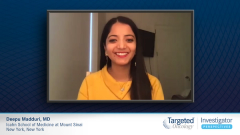
BCMA-Targeted CAR T-Cell Therapy for Multiple Myeloma
Rationale regarding the use of BCMA-targeted CAR T-cell therapy in relapsed/refractory multiple myeloma.
Deepu Madduri, MD: The rationale for using CAR [chimeric antigen receptor] T-cell therapy with BCMA-targeting antibodies in relapsed/refractory multiple myeloma comes from the fact that we found that BCMA is solely expressed on malignant plasma cells. Therefore, we want to have an antigen that we can possibly use that only targets and kills the bad myeloma cells, rather than killing healthy human cells. That was one of the reasons why BCMA is being used as a target in CAR T-cell therapies. We also see BCMA-targeted agents being used in bispecific antibodies. They’re also being used in antibody-drug conjugates, with Blenrep [belantamab mafodotin] becoming the first commercially available BCMA-targeted agent.
When we decide whether a patient should be treated with CAR T-cell therapy versus a bispecific, we look at how the patient is doing. We need to make sure the patient is not rapidly progressing, because it does take 3 to 4 weeks, or sometimes 5 weeks, to manufacture the CAR T cells. We want to make sure we have a therapy that the patient can actually get on after apheresis.
We also want to make sure the patient doesn’t have a lot of comorbid conditions and has a good performance status, because CAR T-cell therapies do have some underlying toxicities, such as cytokine release syndrome and neurotoxicity. We want to make sure the patient is healthy enough to handle these toxicities.
If a patient is rapidly progressing, or they’re elderly, or they have too many comorbidities, we usually prefer off-the-shelf agents like bispecific antibodies or antibody-drug conjugates. But if a patient is young, more fit, doesn’t have rapidly progressing disease that we can’t control with bridging chemotherapy, then we usually prefer to treat with CAR T-cell therapy first.
Transcript edited for clarity.









































